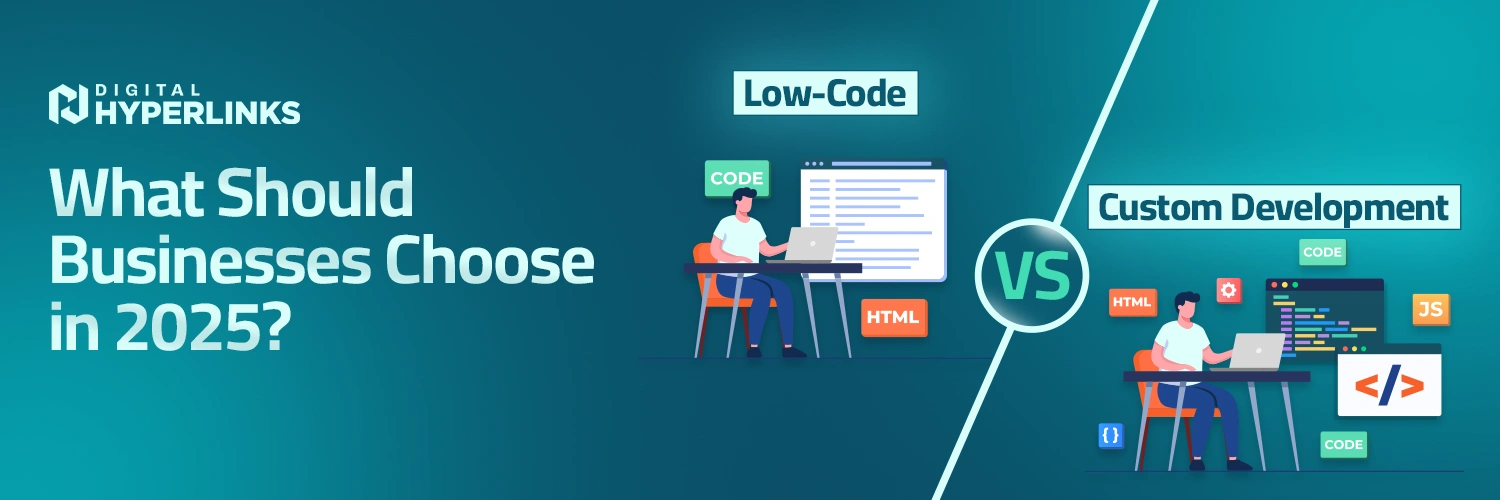Low-Code vs Custom Development: What Should Businesses Choose in 2025?
In the rapidly evolving digital landscape of 2025, businesses face a pivotal decision: should they opt for low-code platforms or invest in custom app development? This choice impacts not only the speed and cost of deployment but also scalability, security, and long-term adaptability.
Choosing between low code vs custom development hinges on your business's unique needs and objectives.This comprehensive guide delves into the nuances of both approaches, providing real-world examples, a detailed comparison table, and insights to help you make an informed decision.
Understanding the Approaches
What is Low-Code Development?
Low-code development utilizes visual interfaces with drag-and-drop features, enabling users to build applications with minimal hand-coding. This approach accelerates the development process, making it accessible to individuals without extensive programming knowledge. It's particularly beneficial for rapid application development and deploying business automation tools. Low-code tools often come with built-in templates, enabling quick iterations and prototyping. However, they may also pose low-code limitations when it comes to handling highly customized or performance-heavy applications.
What is Custom Development?
Custom development involves building software applications from the ground up, tailored to specific business requirements. This method offers unparalleled flexibility, allowing for intricate functionalities, deep system integrations, and enhanced security measures. It's ideal for enterprise software development where unique solutions are paramount and where long-term scalability and system control are vital. Although the initial cost is higher, it often results in more stable and adaptable systems that reflect the brand’s full vision.
Comparative Analysis
Key Considerations
Rapid Application Development
Low-code platforms excel in scenarios requiring quick deployment. They enable businesses to respond swiftly to market changes, test new ideas, and iterate based on feedback. For startups or MVPs, this agility is often critical to entering the market first.
Scalability and Flexibility
While low-code solutions offer speed, scalability of low-code apps remains a concern for enterprises handling large data volumes or requiring multi-layered custom workflows. In contrast, custom app development enables businesses to scale on their terms, ensuring optimal performance as user demand grows.
Security and Compliance
Industries handling sensitive data, such as finance and healthcare, benefit from custom development's robust security features, ensuring compliance with stringent regulations. These systems can incorporate advanced encryption, role-based access, and audit trails that align with global standards.
Maintenance and Support
Low-code platforms handle maintenance and updates, reducing the burden on internal IT teams. In contrast, custom solutions require ongoing support but offer greater control over updates and system changes. Companies like Digital Hyperlinks Pvt Ltd offer managed services to bridge this gap, ensuring smooth transitions and minimal downtime.
Digital Transformation Strategies
Incorporating the right development approach is crucial for successful digital transformation strategies. Businesses must assess their long-term goals, resource availability, and specific needs to choose the path that aligns with their strategic objectives. Whether it’s leveraging low-code tools comparison for quick wins or investing in tailor-made solutions, alignment with the company vision is key.
Real-World Scenarios
Custom Development in Action: Equote for DWWLG
Dynamic worldwide logistics group (DWWLG) aimed to digitize and streamline its quotation system for global agents. Previously reliant on manual processes and back-and-forth communication, the company needed a solution that could centralize and automate quote generation. Digital Hyperlinks developed Equote — a custom web portal that allows agents worldwide to generate quotes according to their specific shipping needs. Once a quote is created, the system automatically notifies the DWWLG team, enabling quick follow-ups and improved responsiveness. In addition, automated report generation and email-based summaries were implemented to enhance oversight and efficiency.
Digital Transformation at Scale: KCCI Portal
The Karachi Chamber of Commerce & Industry (KCCI) was previously managing its Certificate of Origin (CoO) process through manual MS Office workflows — a method that was both time-consuming and prone to delays. To resolve this, we developed the KCCI Portal, a custom application that digitized the entire process. Through the portal, users can register, submit their CoO requests, pay the applicable fees, and upload payment proofs — all within a secure online environment. KCCI officials can then review submissions, approve requests, and enable users to download their digital certificates. Each Certificate of Origin features a unique QR code for real-time authenticity verification. Given that these certificates are critical for exporters sending goods overseas, this solution has become an essential part of KCCI’s daily operations.
FAQs
Q1: Can low-code platforms integrate with existing enterprise systems?
A1: Many low-code platforms offer integration capabilities with popular enterprise systems. However, the extent of integration may be limited compared to custom-developed solutions, which can be tailored for seamless interoperability.
Q2: Is custom development more secure than low-code?
A2: Custom development allows for the implementation of advanced security protocols tailored to specific business needs, offering a higher level of security compared to standard features provided by low-code platforms.
Q3: Which approach is more cost-effective in the long run?
A3: While low-code platforms have lower initial costs, they may incur higher expenses over time due to subscription fees and development cost comparison considerations. Custom development requires a higher upfront investment but can be more cost-effective in the long term, especially for complex applications.
Q4: How do I decide which approach is right for my business?
A4: Consider factors such as project complexity, required customization, scalability needs, budget constraints, and long-term business goals. Consulting with experts, like those at Digital Hyperlinks Pvt Ltd, can provide valuable insights tailored to your specific situation.
Q5: Are low-code platforms suitable for enterprise-grade applications?
A5: Low-code platforms can handle enterprise-grade apps to some extent, but for high-performance or highly customized solutions, custom development is usually more appropriate.
Q6: Can I switch from low-code to custom development later?
A6: Yes, but the migration may involve rework. Planning for long-term scalability from the start helps minimize disruption.
Q7: How do updates work in low-code platforms?
A7: Most low-code platforms handle updates automatically. However, this could introduce unexpected changes. Custom development gives you more control over the update cycle.
Q8: What’s the learning curve for low-code platforms?
A8: Low-code tools are designed for ease of use. With minimal training, even non-developers can begin creating applications quickly.
Q9: Can I prototype in low-code and then build custom?
A9: Absolutely. This hybrid approach allows quick testing of ideas before investing in full-scale custom app development.
Conclusion
Low-code platforms offer speed and accessibility, making them suitable for straightforward applications and rapid deployment. In contrast, custom development provides the flexibility, scalability, and security necessary for complex, enterprise-level solutions. By carefully evaluating your requirements and consulting with experienced professionals, you can select the development path that best supports your business's growth and success in 2025 and beyond.
For personalized guidance on selecting the optimal development strategy, consider reaching out to Digital Hyperlinks Pvt Ltd, experts in both low-code and custom app development solutions.
Get FREE Consultation





















































